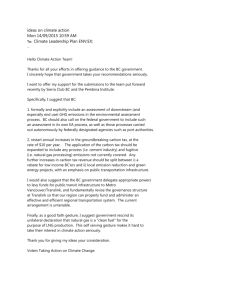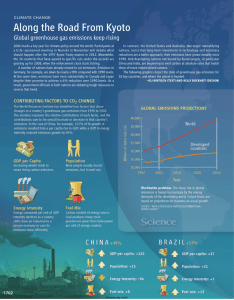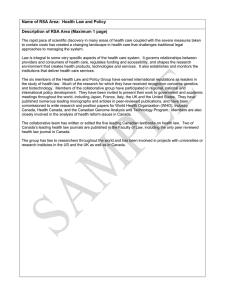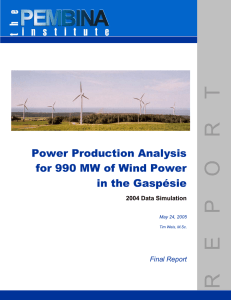R-3526-2004 Pièce GRAME-1, document 2
advertisement
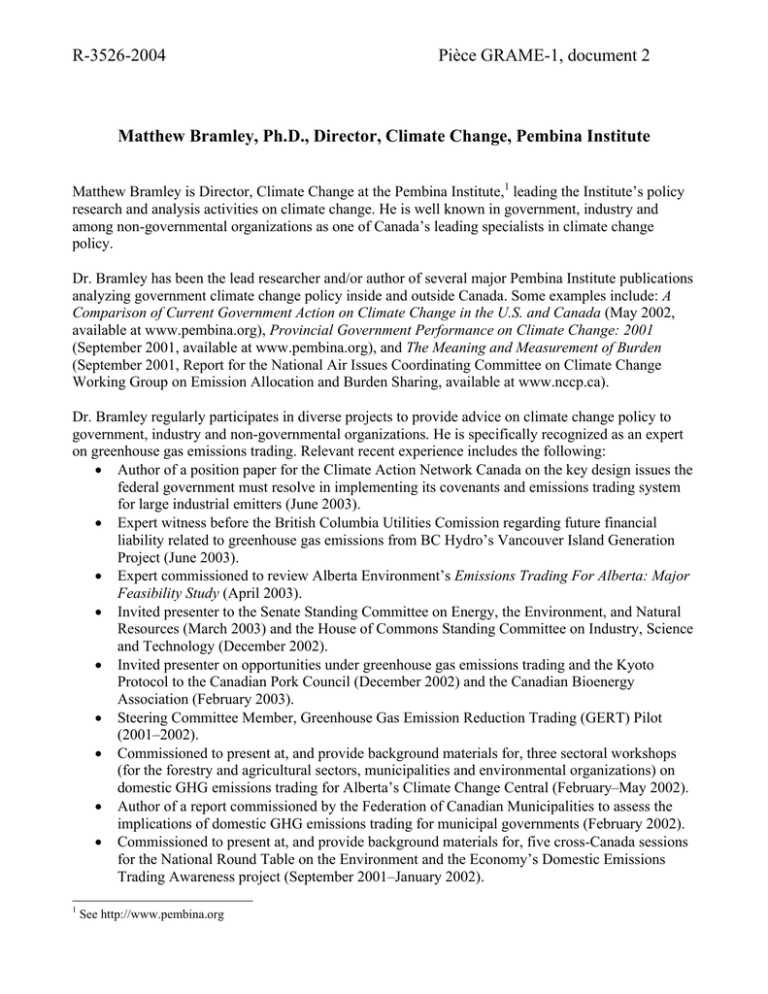
R-3526-2004 Pièce GRAME-1, document 2 Matthew Bramley, Ph.D., Director, Climate Change, Pembina Institute Matthew Bramley is Director, Climate Change at the Pembina Institute,1 leading the Institute’s policy research and analysis activities on climate change. He is well known in government, industry and among non-governmental organizations as one of Canada’s leading specialists in climate change policy. Dr. Bramley has been the lead researcher and/or author of several major Pembina Institute publications analyzing government climate change policy inside and outside Canada. Some examples include: A Comparison of Current Government Action on Climate Change in the U.S. and Canada (May 2002, available at www.pembina.org), Provincial Government Performance on Climate Change: 2001 (September 2001, available at www.pembina.org), and The Meaning and Measurement of Burden (September 2001, Report for the National Air Issues Coordinating Committee on Climate Change Working Group on Emission Allocation and Burden Sharing, available at www.nccp.ca). Dr. Bramley regularly participates in diverse projects to provide advice on climate change policy to government, industry and non-governmental organizations. He is specifically recognized as an expert on greenhouse gas emissions trading. Relevant recent experience includes the following: • Author of a position paper for the Climate Action Network Canada on the key design issues the federal government must resolve in implementing its covenants and emissions trading system for large industrial emitters (June 2003). • Expert witness before the British Columbia Utilities Comission regarding future financial liability related to greenhouse gas emissions from BC Hydro’s Vancouver Island Generation Project (June 2003). • Expert commissioned to review Alberta Environment’s Emissions Trading For Alberta: Major Feasibility Study (April 2003). • Invited presenter to the Senate Standing Committee on Energy, the Environment, and Natural Resources (March 2003) and the House of Commons Standing Committee on Industry, Science and Technology (December 2002). • Invited presenter on opportunities under greenhouse gas emissions trading and the Kyoto Protocol to the Canadian Pork Council (December 2002) and the Canadian Bioenergy Association (February 2003). • Steering Committee Member, Greenhouse Gas Emission Reduction Trading (GERT) Pilot (2001–2002). • Commissioned to present at, and provide background materials for, three sectoral workshops (for the forestry and agricultural sectors, municipalities and environmental organizations) on domestic GHG emissions trading for Alberta’s Climate Change Central (February–May 2002). • Author of a report commissioned by the Federation of Canadian Municipalities to assess the implications of domestic GHG emissions trading for municipal governments (February 2002). • Commissioned to present at, and provide background materials for, five cross-Canada sessions for the National Round Table on the Environment and the Economy’s Domestic Emissions Trading Awareness project (September 2001–January 2002). 1 See http://www.pembina.org R-3526-2004 • Pièce GRAME-1, document 2 Co-author of a report commissioned by the Department of Foreign Affairs and International Trade on additionality and baselines in the Clean Development Mechanism (October 2001). Dr. Bramley is/has also been a member of key national multistakeholder bodies on climate change, including the Advisory Panel to the Analysis and Modelling Group (AMG) (federal-provincial government body charged with conducting economic analysis of greenhouse gas emission reduction options), Shell Canada’s Climate Change Advisory Panel, the Canadian Climate Program Board (overseeing federal government programs on climate science), the Canadian Public Health Association’s Steering Committee for the Roundtable on Health and Climate Change, and the Canadian Standards Association’s Canadian Advisory Committee on Climate Change. Matthew Bramley has a Ph.D. in theoretical chemistry from the University of Cambridge, U.K.

